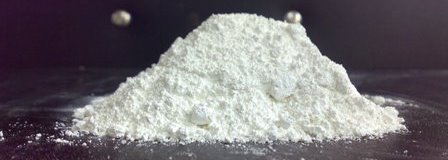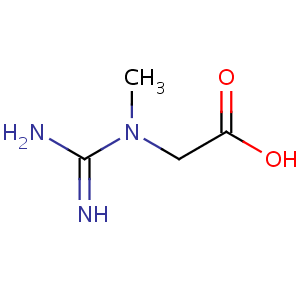Experimenting with Creatine Supplementation
February 11, 2011
As I mentioned earlier this week, I have an opening in the supplement experimentation part of my life. An opening I will fill with Creatine. Creatine Monohydrate Powder to be exact.
For some reason, Creatine has always been a dirty word for me. A friend of mine took it on advice from his high-school baseball coach, and I remember my surprise that he was willing to tell us about it because I thought it was an anabolic steroid. I should have looked into it more at the time. Instead I missed out on what could have been a useful supplement for me as images of syringes and spoons danced in my head.
We’ll take a more in-depth look at Creatine in a minute, but here are a few quick facts: Creatine is found in food (mostly red meat), and our bodies make it. Also, it seems impossible to overdose with.
Let’s dive in.
 What is it?
What is it?
As you can see, it’s an organic substance. It’s found in our meat, and in the meat we eat (from all animals with spines anyway). A male about my weight typically runs around with about 120g of Creatine in his body. It’s safe and natural, at least when consumed from whole food sources, or built within the body. However it gets to you, Creatine Monohydrate gets paired up with a Phosphate molecule and becomes Creatine Phosphate (you may have heard it called phosphocreatine). Creatine Phosphate on hand means your muscle cells will have ample Adenosine Triphosphate (ATP) when needed, because Creatine Phosphate is all you need to turn ADP (waste that results from using ATP as a fuel) back into ATP. Imagine how great it would be if you had something for your car that turned tailpipe fumes into gasoline in the tank! ATP gets credit for giving the big push on low-rep, high-load movements, but it is actually used in all muscle contraction. It is likely mentioned for these types of exercise because this is where you notice when the ATP doesn’t show up, or rather, when you blow through your bank account and don’t have ATP left to burn (completing a set to failure).
What does it do?
It can make you more powerful in short bursts. More strength and power means more weight or more reps, which, intuitively, can lead to gains. See that argument here.
A similar, but distinctly different argument is that Creatine supplementation increases capacity, but not strength. So your 5 rep max becomes your 7 rep max, but your 1 rep max does not change. This includes, of course, that heavier lifting will lead to strength gains, so you come out looking about the same.
As far as hormones go, Creatine supplementation increases DHT levels without lowering testosterone levels, which means that overall effective testosterone is increased. It may even mean that Creatine blocks estrogen synthesis to some extent. That would be swell.
I noticed that Martin from Leangains thought there was more to the picture, so I did some more digging.
This study is what I found. Ok fine, you don’t have to read it. I linked the full text (not just the abstract), because in addition to their wonderful findings on satellite cells, myonuclei per fibre, and mean muscle fibre area (results: creatine > protein > carbs), they have this little gem hidden at the end:
It has been suggested that the enhanced muscle size gain observed when strength training is combined with creatine supplementation could be caused by a rise in training quality and/or greater total training load (Volek et al. 1999), which was supported by a higher total resistance load lifted by creatine supplemented subjects as reported by Steenge (1999). Such effect of increased work output during creatine supplementation could cause a greater than normal stimulus to muscle anabolism (Louis et al. 2003a). However, it is not obvious how increased hypertrophy should result merely from a marginally greater training intensity or volume in a progressive training programme, as the acute stimulation of muscle protein synthesis does not seem affected by the intensity of the preceding contractile activity (M. Rennie, personal communication; manuscript in preparation). Accordingly, in the present study total training load was not greater in subjects supplemented by creatine compared to the subjects supplemented by protein and placebo.
The claim here is that the Creatine group didn’t work out any harder, but still had better gains. That sounds pretty ideal to me.
However they come, Creatine seems to offer returns in anaerobic strength, capacity, and muscle size. Oh, and it builds your system in such a way that you rebuild better after a workout. All of this in a safe package? Sounds good so far.
The Water Issue
Many people believe that Creatine supplementation only adds mass because it causes water retention. So many people that Men’s Health included it as a Q for their Creatine Q&A. There seems to be plenty of research showing that water content as a percent of total mass is unchanged by creatine supplementation, or that creatine supplementation increases total mass of both water and “dry matter”. Either way, it seems that most everyone agrees it makes you more athletically able in some way, something that is not achieved only with bloating. And besides, if it makes you a better athlete with bigger muscles, does it really matter what’s inside those muscles?
How will I use it?
There seems to be much discussion about whether to undergo a loading period when starting use. Some say you won’t get anywhere without it, and some say it’s a waste of money. The “pro-load” camp recommends 7-14 days of 20-25 g per day before settling to the generally agreed upon dose of 5 g/day.
I’m going to take a middle ground – first seven days I’ll take 5g post-workout and 5g before bed, then I’ll go to 5 g/day. I’ll continue this until mid-March, then take a break for at least two weeks. Then we’ll take it from there.
Dose Timing
You may have noticed that I took care to mention when in my day I’ll take it. That’s because most will tell you that you should take the Creatine with carbs (my bottle even goes as far as recommending apple juice as a mixer – yea right), and I have been having carbs PWO. The bedtime dose is because I heard rumblings from Robb Wolf (via some old forum post) that it may increase growth-hormone secretion, and I’d love to have that around for making testosterone whilst I doze. The only info I can find “confirming” this is on this very sketch-looking site. Well, it can’t hurt.
As always, I’m keeping tight records and I’ll keep you in the loop.
Entry filed under: Self Experiment. Tags: .





What’s Being Said